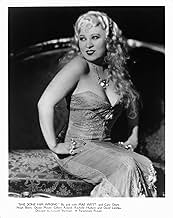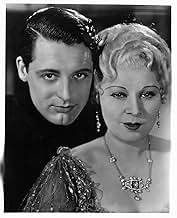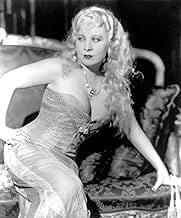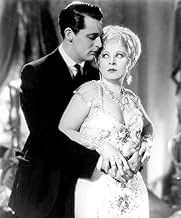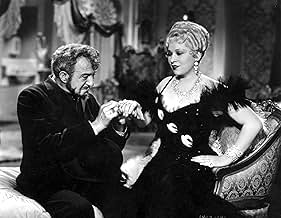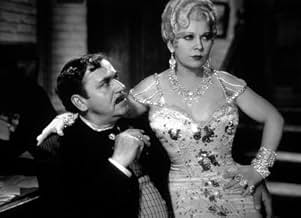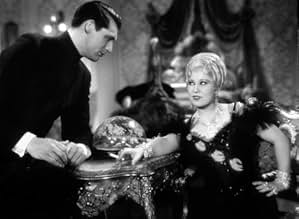IMDb रेटिंग
6.3/10
7.4 हज़ार
आपकी रेटिंग
अपनी भाषा में प्लॉट जोड़ेंIn the Gay Nineties, a seductive nightclub singer contends with several suitors, including a jealous escaped convict and a handsome temperance league member.In the Gay Nineties, a seductive nightclub singer contends with several suitors, including a jealous escaped convict and a handsome temperance league member.In the Gay Nineties, a seductive nightclub singer contends with several suitors, including a jealous escaped convict and a handsome temperance league member.
- 1 ऑस्कर के लिए नामांकित
- 5 जीत और कुल 1 नामांकन
Noah Beery
- Gus Jordan
- (as Noah Beery Sr.)
Robert Homans
- Doheney
- (as Robert E. Homans)
Ernie Adams
- Man in Audience
- (बिना क्रेडिट के)
Billy Bletcher
- Singing Waiter
- (बिना क्रेडिट के)
Wade Boteler
- Dan's Pal
- (बिना क्रेडिट के)
Jack Carr
- Patron Who Hits His Girl
- (बिना क्रेडिट के)
फ़ीचर्ड समीक्षाएं
It appears that some modern day critics have forgotten what a great period film is all about. This very authentic replica of the Gay Nineties (1890s) is accurate right down to the horse hair furniture, gas lamps, Brooklyn accents and costumes. It was adapted from Mae West's Broadway hit "Diamond Lil" and coupled with West's other 1933 hit (I'm No Angel), saved Paramount from bankruptcy. The film was so loved by audiences that midnight showings were needed to accommodate the crowds, and it was so lurid that seven countries banned the film altogether. It was nominated for the best picture of 1933 and was West's favorite of all her twelve films. The film introduced the famed line (although it's uttered slightly different in the movie) "Come up and see me sometime." Some of Mae's funniest work is here, and she sings three great tunes. Edith Head did all the costumes and Lowell Sherman directed. Modern times have dulled the bluntness of this film, but be assured, it was an eye-popper in 1933.
After a supporting role in the George Raft film Night After Night, Paramount films realized what a gold mine they had in Mae West. Between her and a young radio singer named Bing Crosby, they pulled Paramount from the brink of bankruptcy, the white mountain studio nearly went under in the early Thirties.
After this the studio gave Mae her head in choosing material and she decided to use one of her own original plays, She Done Him Wrong. The story is set in the Bowery district of the 1890s and New York of the 1890s is where Mae grew up, she had a good ear and a good memory for character types she uses in the film.
Mae always plays Mae West and would you really want her as anyone else? She's a Bowery entertainer of the period, working in this case for Noah Beery's club as the main attraction. Beery's into some really shady business, he doubles in white slavery and nearly gets innocent Rochelle Hudson who tries to kill herself in his club. Mae saves her, but turns her over to Beery because she doesn't know about his other sideline. All she knows is that he pays off in diamonds as well as cash.
Besides Beery panting after her, we've got silent screen star Owen Moore, young Gilbert Roland who is the assistant to white slaver Rafaela Ottiana and in the film that would be his breakthrough, Cary Grant as a Salvation Army worker who's not all he seems. Mae personally picked Grant for his role, he was a young Paramount contract player beginning to get some notice. But as I said before in my review of I'm No Angel, this is not a Cary Grant film, this is a Mae West film.
Mae besides being one of the great sex symbols of the last century had a great memory and eye for detail of the bawdy Bowery of her youth. Good thing she came along before The Code was put in place. Her first films are her best, The Code definitely hampered her style.
And Mae West if she had anything, had style.
After this the studio gave Mae her head in choosing material and she decided to use one of her own original plays, She Done Him Wrong. The story is set in the Bowery district of the 1890s and New York of the 1890s is where Mae grew up, she had a good ear and a good memory for character types she uses in the film.
Mae always plays Mae West and would you really want her as anyone else? She's a Bowery entertainer of the period, working in this case for Noah Beery's club as the main attraction. Beery's into some really shady business, he doubles in white slavery and nearly gets innocent Rochelle Hudson who tries to kill herself in his club. Mae saves her, but turns her over to Beery because she doesn't know about his other sideline. All she knows is that he pays off in diamonds as well as cash.
Besides Beery panting after her, we've got silent screen star Owen Moore, young Gilbert Roland who is the assistant to white slaver Rafaela Ottiana and in the film that would be his breakthrough, Cary Grant as a Salvation Army worker who's not all he seems. Mae personally picked Grant for his role, he was a young Paramount contract player beginning to get some notice. But as I said before in my review of I'm No Angel, this is not a Cary Grant film, this is a Mae West film.
Mae besides being one of the great sex symbols of the last century had a great memory and eye for detail of the bawdy Bowery of her youth. Good thing she came along before The Code was put in place. Her first films are her best, The Code definitely hampered her style.
And Mae West if she had anything, had style.
She Done Him Wrong (1933)
*** (out of 4)
Set during the "Gay Ninetiest," Mae West stars as Lady Lou, a nightclub singer who pretty much seduces and vamps over any man that enters the club. Since she has her pick of the litter she sets her sights on the handsome Captain Cummings (Cary Grant).
To say SHE DONE HIM WRONG was 100% Mae West would be an understatement. The actress was a smash on Broadway and her sexual act was quite legendary even during a time when that type of thing wasn't always wanted or allowed. Her stage play was attempted to get on the big screen for a couple years before this film finally did it even though it had to be watered down some. With that said, there's still plenty of sexuality on display here, although you can't help but think this is one of the films that helped eventually bring on the Production Code.
As far as the film goes, it was a smash when it was originally released and it even got a Best Picture Oscar nomination. Watching it today the film is obviously not as strong but at the same time you can't help but watch it and just imagine how people must have felt about it in 1933. The main reason to watch this is of course for the performance of West who is pretty much playing herself. The over-the-top, heated sexuality is actually a lot of fun to watch. You know, I've never found her to be an "attractive" woman but the way she forces her sexuality is just something that works.
The supporting cast is quite good including Grant in another early role where he's pretty much playing that good looking guy that's the object of the main characters affection. Owen Moore, Noah Beery, Sr. and Gilbert Roland are all good as well. The screenplay is another plus or at least the dialogue spoken by West is. She gets a couple classic lines and her delivery is certainly a plus. With that said, the story itself is pretty hit and miss but the 66-minute running time does fly by.
*** (out of 4)
Set during the "Gay Ninetiest," Mae West stars as Lady Lou, a nightclub singer who pretty much seduces and vamps over any man that enters the club. Since she has her pick of the litter she sets her sights on the handsome Captain Cummings (Cary Grant).
To say SHE DONE HIM WRONG was 100% Mae West would be an understatement. The actress was a smash on Broadway and her sexual act was quite legendary even during a time when that type of thing wasn't always wanted or allowed. Her stage play was attempted to get on the big screen for a couple years before this film finally did it even though it had to be watered down some. With that said, there's still plenty of sexuality on display here, although you can't help but think this is one of the films that helped eventually bring on the Production Code.
As far as the film goes, it was a smash when it was originally released and it even got a Best Picture Oscar nomination. Watching it today the film is obviously not as strong but at the same time you can't help but watch it and just imagine how people must have felt about it in 1933. The main reason to watch this is of course for the performance of West who is pretty much playing herself. The over-the-top, heated sexuality is actually a lot of fun to watch. You know, I've never found her to be an "attractive" woman but the way she forces her sexuality is just something that works.
The supporting cast is quite good including Grant in another early role where he's pretty much playing that good looking guy that's the object of the main characters affection. Owen Moore, Noah Beery, Sr. and Gilbert Roland are all good as well. The screenplay is another plus or at least the dialogue spoken by West is. She gets a couple classic lines and her delivery is certainly a plus. With that said, the story itself is pretty hit and miss but the 66-minute running time does fly by.
Mae West is another one of those actresses that played the same role time after time. She played Mae West. What distinguishes the movies are the lines and she was a masterful created of double entendre with a big load of sex. She would surround herself with the actors of the day, like Gilbert Roland and Wallace Beery. The one that benefited the most here was Cary Grant. It's hard to realize that he goes back so far. I have to admit that for mot of my life I found West's thing to be off handed and tiresome. But now I know that she had great timing and and interesting stage presence. She could deliver a "dirty" line like no other. This gave us the famous like, "Come up and see me sometime."
Mae West had a Broadway smash when she penned the bawdy tale of DIAMOND LIL for herself--and with a few tweaks here and there the story came to the screen as SHE DONE HIM WRONG. The film was an immediate hit and the role of Lady Lou remains one of West's best remembered performances. The script is jam-packed with some of West's most famous lines, including the memorable "Come up'n see me sometime. I'm home every evenin'" and "You can be had." West throws her lines with style, aplomb, enough innuendo to make a censor cringe, and considerable humor--but, somewhat surprisingly, the movie is not really a comedy.
SHE DONE HIM WRONG is a hard-knocks tale of Bowery bruisers who dance attendance upon the 'Lady Lou' and often resort to crime to keep her dripping in the diamonds she prizes above all else. But although she has one lover already locked up in jail, another one mixed up in the white slavery rackets, and still a third waiting to step into the gap, the Lady Lou is more interested in seducing missionary Cary Grant... only to find him less interested in her body than her soul, a circumstance that prompts West to utter one of the most how-did-that-get-past-the-censors lines in 1930s cinema: "Maybe I ain't got no soul." This is a surprisingly tough little movie, and in addition to West's zinging lines and occasional musical numbers SHE DONE HIM WRONG also offers a glimpse at a very young (and still slightly wooden) Cary Grant; it also has an ensemble cast that plays in a very enjoyable grand manner, truly first rate production values all the way, and A surprisingly brisk running time. West did funnier films than this, but the mix of her sharp wit and the rough story is particularly memorable. This is where the fire started really started, and I recommend it very strongly.
Gary F. Taylor, aka GFT, Amazon Reviewer
SHE DONE HIM WRONG is a hard-knocks tale of Bowery bruisers who dance attendance upon the 'Lady Lou' and often resort to crime to keep her dripping in the diamonds she prizes above all else. But although she has one lover already locked up in jail, another one mixed up in the white slavery rackets, and still a third waiting to step into the gap, the Lady Lou is more interested in seducing missionary Cary Grant... only to find him less interested in her body than her soul, a circumstance that prompts West to utter one of the most how-did-that-get-past-the-censors lines in 1930s cinema: "Maybe I ain't got no soul." This is a surprisingly tough little movie, and in addition to West's zinging lines and occasional musical numbers SHE DONE HIM WRONG also offers a glimpse at a very young (and still slightly wooden) Cary Grant; it also has an ensemble cast that plays in a very enjoyable grand manner, truly first rate production values all the way, and A surprisingly brisk running time. West did funnier films than this, but the mix of her sharp wit and the rough story is particularly memorable. This is where the fire started really started, and I recommend it very strongly.
Gary F. Taylor, aka GFT, Amazon Reviewer
क्या आपको पता है
- गूफ़Shadow of camera moves against the back wall of Lady Lou's apartment while she and Sally are talking.
- इसके अलावा अन्य वर्जनMaryland, Massachusetts, New York, Ohio, and Pennsylvania removed the song "A Guy What Takes His Time". Will H. Hays and Adolph Zukor went to New York to edit the song to an entrance by Mae West, one opening verse, and one closing verse to lessen the suggestiveness. Despite this, Ohio and Pennsylvania cut all of West's one liners.
- कनेक्शनFeatured in The Twentieth Century: The Movies Learn to Talk (1959)
टॉप पसंद
रेटिंग देने के लिए साइन-इन करें और वैयक्तिकृत सुझावों के लिए वॉचलिस्ट करें
- How long is She Done Him Wrong?Alexa द्वारा संचालित
विवरण
बॉक्स ऑफ़िस
- बजट
- $2,00,000(अनुमानित)
- चलने की अवधि1 घंटा 6 मिनट
- रंग
- पक्ष अनुपात
- 1.37 : 1
इस पेज में योगदान दें
किसी बदलाव का सुझाव दें या अनुपलब्ध कॉन्टेंट जोड़ें



